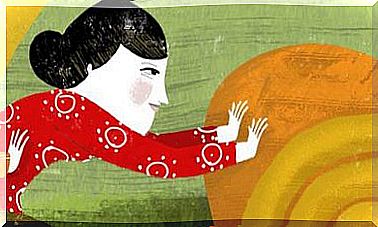The Role Of Grandparents In The Family
Grandparents can transmit the essence of their knowledge and all their experience, but they should remain themselves and enjoy and grow as much as possible.

The relationship between grandparents and grandchildren has changed over time, but the link between the two has always remained unchanged in terms of its quality and importance.
When parents, children and grandparents lived together in the same household, the ascendancy over the grandchildren was greater and the reference of the grandparents as an educational model coexisted alongside the father. However, at present it seems that grandparents exercise more of a role of caregivers, of part-time “babysitters” to cover the periods of time in which children are without their parents.
On the other hand, older people themselves have changed their values and their lifestyles. Today being a grandfather does not imply being an “old man”, since the improvement in the quality of life makes these people have other interests beyond dedicating themselves to the care of their grandchildren. Thus, there are many grandparents who work, do sports, attend various courses or shows, and go on excursions or trips.
Despite these changes, the relationship and contact between grandparents and grandchildren continue to be very enriching for children’s education.
Grandparents have a very significant place in their emotional world since, among other things, they represent the family background and the legacy of another time.
What role do grandparents play in education? How to avoid conflict
Although it is the responsibility of parents to educate their children, it is undeniable that grandparents who spend a lot of time with their grandchildren end up having a great influence on them and their education, which can end up being a source of conflict and contradiction.
It is therefore very important to specify the roles of each one and try to make it very clear who is who to the little ones, since in certain cases they could end up seeing grandparents as parents and parents as older siblings or other less significant people.
First of all, it is therefore advisable that there is good communication between grandparents and parents, which will clarify doubts and explain which ones with the issues that parents believe are fundamental.
Conflicts often arise over discipline issues, since grandparents tend to relax it, be more condescending, and give more pampering and whims than parents. This tendency can be harmful to children, firstly because grandparents do not follow the same criteria as parents and secondly because the little ones can end up bullying them.
Grandparents must understand that it is not the same to go to visit or have children come to their home for an afternoon or a night –where their greater permissiveness would be more justifiable– than to be in charge of their grandchildren day by day.
Parents should value the role of grandparents in front of their children and make them respect them and pay attention to them, not only because they are their grandparents but also because they are older people.
Grandparents, for their part, thanks to their experience as parents, can act as mediators in conflicts between their grandchildren and parents on many occasions, softening situations and contributing other points of view.
The general criterion is that parents are the basic models of reference in the education of their children, who transmit their values and norms, while grandparents must play a complementary role, respecting those values and enforcing those norms. But also, and above all, providing a type of affection and affection that only they as grandparents can provide.
A unique contribution: living history of the family
The figure of grandparents should be seen as something more than that of trusted caregivers. Grandparents represent generational continuity, the link to a tradition and a family genealogy.
They are the parents of the parents, the witnesses of their childhood and those who can best explain it to the children : if they did the same tricks, if they had to be punished, the things that they liked, in which they excelled … This helps the child to enroll in that family story.
Likewise, grandparents exemplify other values, customs and ways of living. They are the witnesses of historical moments that the family lived and can transmit them first hand. Grandparents must remind their grandchildren of all this legacy, both social, family or personal, explaining it as their own grandparents did, even if they are branded as a ticker , since children love to hear those experiences and anecdotes firsthand.
Separation should never imply the breaking of the family tree of which the child continues to feel like a member.
Precisely for this reason, it is very important to value this role and not break the family tree. When a couple divorces, in many cases the breakup unfortunately leads to disputes regarding the extended family: grandparents, uncles, cousins … which means that a close relationship with grandparents can be broken due to decisions made by parents from anger and intransigence.
But it should be borne in mind that divorce only occurs between parents and, just as they must continue to fulfill their parental functions with their children, the rest of the family must continue to be present for the children ; that is, grandparents are still your grandparents, uncles are still uncles, and so on.
How to foster the grandparent-grandchild bond
Beyond the care and contact with tradition, the most important function of grandparents with their grandchildren is the affective bond, and this, like any other bond, must be continuously worked on and promoted.
It is almost automatic that grandparents feel great affection for children, but for this affection to also occur in the opposite direction, grandparents have to have an active participation in the lives of their grandchildren, which does not mean that they interfere in the relationship with their parents.
The way in which they participate in their life depends, many times, on the type of life of the parents, on whether they call on their grandparents on a daily basis to help them in their care because they need it or, on the contrary, they are parents who They can take care of their children themselves and do not need this continuous help.
It is clear that continuous interaction facilitates the establishment of the affective bond, but not because some grandparents do not see their grandchildren regularly, they will love them less.
The important thing is that children, beyond the frequency of this contact, feel loved by their grandparents, that when they see each other they feel that they are loved for who they are, that grandparents are interested in them when they talk to their parents, they know how their studies are going, they know their hobbies and are excited about their progress.
From all this, a good harmony between grandchildren and grandparents will be generated , which will allow the grandchildren to also be interested in their grandparents and promote the meeting with them, asking to go visit them or even spend a night at their house because they know that will be well cared for and cared for.
More than the time spent with the grandchildren , therefore, the quality of that time and the amount of affection and feeling that is invested in that contact is fundamental.
Fun activities for grandparents and grandchildren
Today’s grandparents can undertake multiple activities with their grandchildren, since they tend to have a higher quality of life, better health and greater vitality than the grandparents of previous generations. We must always ensure that those activities that grandparents and grandchildren do together respond more to the interest of the children than that of the grandparents, such as:
- Accompany them to the cinema or theater to see a children’s play.
- Share mutual hobbies, such as taking a bike ride, playing a musical instrument, watching a television program, etc.
- Read stories and books appropriate to their age.
- Make them participate in their world and their interests, such as cooking a cake or their favorite dish together, showing them places where they go regularly, such as the social club, the gym, the park, the library …
- Accept them as teachers, since in some things children are more advanced than their grandparents and they love to teach them, especially in what has to do with new technologies: computers, digital photography, mobile phones, handling DVDs, etc.
- Tell them about their own childhood and youth, as well as the different historical moments they have lived and about their own family. Children welcome the anecdotes that grandparents can tell about themselves, their parents, uncles and acquaintances, as well as listening to songs from other times and having old photographs explained to them.
Who cares for the caring grandparents?
It is very good that grandparents feel happy and happy to be able to collaborate in the care of their grandchildren, but it is important that they do not forget themselves, their own lives and priorities, or the partner they may have.
The obligation to care for and educate their children has already been fully fulfilled. They can continue to help them, but without forgetting to carry out those activities and projects that are of most interest to them.
Currently, being a grandfather does not necessarily imply being retired, but in any case it is convenient to enjoy the days without the pressure or commitment to help your children: take a trip or a getaway, cultivate a sport or hobby, do whatever you can. more meaning to your life.
Taking care of yourself is not a selfish act, especially at these ages. It also helps you to be better with your grandchildren, because you will be calmer and happier with them, and it will be easier to convey that joy of living that you still have.
We could summarize that need to respect the role of grandparents in these “five rights of grandparents”:
- Counselors. If you spend time with children, take their comments and opinions into account, as they are very reliable observers.
- Autonomy. Although the functions are delimited, they should be left to carry them out in their own way.
- Respect. Instilling children with respect for grandparents is a way of generalizing that respect to older people.
- Endearment. The pampering of grandparents should be tolerated, as long as they are not excessive, since that is one of their functions and children know how to distinguish the tolerance of grandparents from the uprightness that parents may have.
- Gratitude. Their dedication should be valued, since they represent a great help to family dynamics and they give up their time to care for their grandchildren.
How to support the child before the death of the grandparents?
Unavoidably, one day or another, grandparents are going to die and faced with such a dramatic situation, many parents wonder how they should act. Children are better prepared than you think to overcome this situation.
Death usually does not come suddenly but after a more or less long disease process. It is therefore convenient to keep the child informed and to have him warned of a possible outcome.
When this occurs, both your questions and the way you participate in the grieving process will depend on many factors: age, which will allow you to understand things one way or another, your character, but also your ability. parents to experience this situation and to allow the child to express himself.
If you don’t speak to him or answer his questions, he will think he shouldn’t ask or be sad.
In general, the smallest ones have their own resources and defense mechanisms against the fear that death causes them.
In fact, until the age of seven the child experiences death as something alien or distant. It is difficult for them to imagine their own death or that of someone close to them. That is why your questions appear without anguish. It is also possible that if we tell them the truth, their wish will prevail over reality and they cling to the belief that whoever has died has not done so, or is going to resurrect as in the stories.
The most important thing, therefore, is to let the child express himself and share the feelings among the whole family. Making it easier for the child to go to the funeral home for a while and attend the funeral is increasingly common, and it is also highly advisable. These rituals allow the family’s love for the deceased to be concentrated, to appreciate what was received from him and to close his passage through this world with gratitude and conscience.
If the deceased had a close relationship with the child, it is easy for him to acknowledge the absence, and to express his sadness in various ways. You have to give your child affection and allow life without the grandfather to take on nature little by little.









